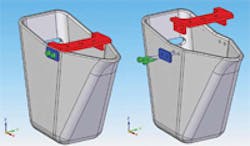Thin-Wall Composite, Auto-Pour Ladle Improves High-Pressure Diecasting
Pyrotek Inc. introduced the RFM refractory-composite auto ladles in 2004. These ladles have gained wide popularity in squeeze casting, sand, and permanent mold aluminum casting operations, because they help to reduce oxide-induced scrap due to their non-wetting properties, and offer a longer service life compared to fiber-laminate ladles. Now, Pyrotek has developed an RFM ladle to address the needs of highpressure diecasters.
RFM Auto-Pour Ladles are constructed from light-density refractory-composite material using a lamination process to produce ladles that are both tough and tolerant to mild mechanical abuse. The RFM material is hard wearing and has better insulating characteristics compared to other materials used in this application. With a material density of 1,600 kg/m3 it offers an exceptional strength-to-density ratio and, with a factory-prepared finish of boron nitride, offers outstanding non-wetting characteristics.
The Thin-Wall RFM ladle was designed to address the tight space constraints of the dip well and pouring envelope typical in high-pressure diecasting. Thin-Wall RFM ladles are half as thick as standard RFM ladles, and include a non-stick boron nitride coating that prevents aluminum build-up. The ladles are manufactured over a mold for consistent shape and pour weights. Additionally, the bolt-throughthe- wall modular bracket is re-usable, adding to the system’s value.
Developmental testing results have shown that the thin-wall design is able to navigate the smallest dip wells and deliver the aluminum to the shot sleeve without interference with the machine platen at full rotation.
The non-wetting, ZYP boron-nitride coating prevented aluminum from sticking inside the ladle, helping to reduce downtime for ladle maintenance and cleaning. The average machine downtime for ladle maintenance for Thin-Wall RFM ladles was 2%, compared to 15% downtime for fiber-laminate ladles. The contributing factor leading to the increased downtime for the fiber-laminate ladles was aluminum build-up inside the ladle that leads to a lack of aluminum delivered to the shot sleeve and a subsequent non-fill casting. The Thin-Wall RFM ladle lowered the amount of time needed for cleaning the build-up.
Thin-Wall RFM ladles lasted on average four to six times longer than fibre-laminate ladles, with typical service life of six months. Benefits with Thin-Wall RFM auto-pour ladles include: reduced operator maintenance time; increased machine efficiency; improved repeatability from ladle to ladle, and reduced acquisition cost verses service life.
Visit www.pyrotek-inc.com
